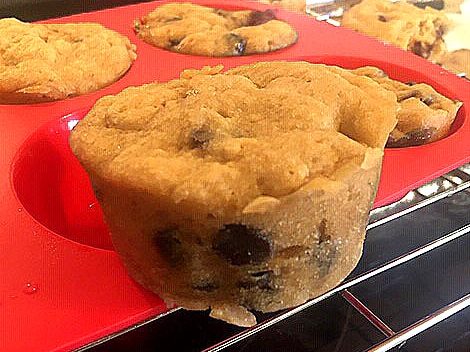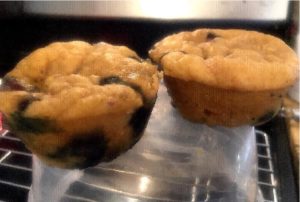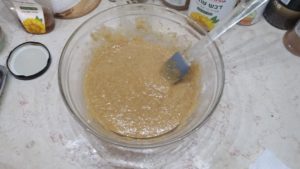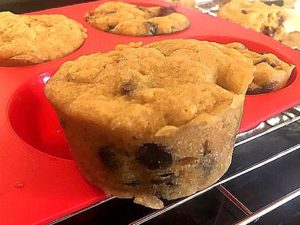Gluten-Free Dairy-Free Microwave Berry Muffins

MICROWAVE *ANY-BERRY MUFFINS
Total time: 12 mins. SERVES: 8
You will love these light, fluffy muffins!!
What a surprise! I’m always making banana muffins
because I don’t want to add sugar to them. Well, I hit a
morning where I was short of time and we were out of
muffins. “Out of Stock” is so rare for me. We both like to
eat a muffin for breakfast, not just because we love eating
cake for breakfast, but to ensure getting nutrition and fiber.
I knew from my fluffy, tasty microwave challah, and my
microwave chocolate cake and layer cake recipes, that
baked goods can shock you and come out light and fluffy
from the microwave. Well, these muffins are the best yet!


My husband said, “switch to these permanently.” But they
don’t stay moist as long (packed in the fridge) as did my
heavier-banana-based muffins. So I suggest using some brown
overripe banana in place of sweetener.
You won’t taste the banana. If you do detect it, use a less ripe
banana. (Add 2 or 3 tbs. of coconut sugar or honey if these are
not sweet enough for your taste). Some berries are more tart
than others.

DRY INGREDIENTS
1 cup gluten free oat flour
1/2 cup tapioca
1 tsp. baking powder
1⁄2 tsp. baking soda
1⁄2 tsp. salt
1⁄2 tsp. xanthan gum omit if your blend has it
(You can Sub gum with 1 tsp ground flax or chia seed)
WET Ingredients
1 large egg (substitute not recommended)
1/4 cup coconut oil
1⁄3 to 1⁄2 cup banana or date puree or (honey or maple syrup)
1⁄3 cup almond milk or any plant based milk
2 tbs. lemon juice or cider vinegar
1 cup fresh or frozen blueberries (raspberries, etc.)
*(or chocolate chips, chopped nuts or dried fruit)

DIRECTIONS
Combine the flour, baking soda, baking powder
and salt in a bowl. Melt the honey and coconut oil together.
Stir in the milk, egg and lemon juice. Combine the wet
ingredient and the dry ingredients and mix a little. Add
the blueberries and mix gently until no white streaks of
flour remain.
Coat a microwave-safe silicone muffin tin or 6 Pyrex
1-cup custard cups with nonstick cooking spray.

Fill cups half-full of batter.
Microwave five or six at a time for about 2-1/2 minutes
for an 1100-watt microwave.
I found that 3 minutes+10 seconds was precise for 4
muffins in my silicone mold, (but I overfilled the muffin cups).
My batter would have made 10 instead of 8 if half-filled,
and my microwave is only 1000-watts.
(Start checking them at about 21/2 minutes.) When they
look set, they’re done. Do not overcook.
Let stand 3 to 5 minutes to firm up. Remove from cups.
*Benefits of Blueberries
Blueberries contain folate, vitamin A, calcium, phosphorus,
magnesium, beta-carotene, vitamin E, and manganese! They’re
also known for being rich with antioxidants – blueberries contain a
flavonoid called anthocyanin, which give blueberries many of their
health benefits as well as their signature color. Because blueberries
freeze so well, it’s easy to enjoy this fantastic fruit year-round.
1. Muscle recovery blueberries can increase the rate of muscle
strength recovery and muscle repair.
2. Blueberries can reduce inflammation and protect against the
artery hardening that raises the risk of heart attack and strokes.
3. Fighting urinary tract infections, Blueberries have the same
anti-adhesives anti-adhesives in cranberry juice that prevent
bacteria from infecting the bladder.
4. Damaged DNA also contributes to the growth of cancer, The
high levels of antioxidants in blueberries neutralize some of
the free radicals that can damage DNA.
5. Blueberries contain several minerals and vitamins that contribute to
bone health, like iron, phosphorous, calcium, zinc, and vitamin K.which
improves calcium absorption Low vitamin K levels have been linked
risk of bone fracture, as vitamin K intake .
6. These phytochemicals help blood flow and the regulation of blood
pressure Research indicates blueberries may prevent hypertension.
7. Blueberries can improve insulin sensitivity, which lowers the risk of type
2 diabetes, heart disease, and stroke. Research suggests blueberries
can help lower blood sugar levels as well.
8. Weight loss and healthy digestion The relatively high fiber content of
blueberries can help prevent constipation and maintain a regular digestive
system. Adequate fiber in your diet can help you achieve a full feeling,
reduce overall caloric intake, and assist in weight-loss efforts.
9. Skin damage prevention Collagen, which relies on vitamin C to function
correctly, is what makes the skin elastic and prevents skin damage from
the sun’s UV rays and environmental pollution. One serving of blueberries
contains nearly a quarter of the recommended daily value of vitamin C.
10. Improved brain function A 2019 study investigated the relationship between
blueberry consumption and cognitive abilities. It found blueberries can “improve
delayed memory and cognitive function in children, healthy older adults, and adults
with some cognitive impairment.Blueberries also improve short-term memory.
The nutritional rundown
A serving size of blueberries is one cup, which is 148 grams, or
anywhere from 65 to 75 berries. According to the USDA, based
on a 2,000-calorie diet, one serving of blueberries contains:
Calories: 84.4
Protein: 1.1 grams (2% recommended dietary intake [RDI])
Carbohydrates: 21.4 grams (7% RDI) Sugar: 14.7 grams
Potassium: 114 milligrams (3% RDI) Fiber: 3.6 grams (14% RDI)
Vitamin C: 14.4 milligrams (24% RDI) Vitamin B6: 0.77 milligrams (5% RDI)






You must be logged in to post a comment.